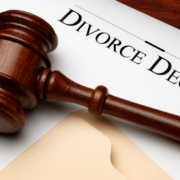5 Reasons to Avoid Going to Divorce Court
The familiar phrase “ugly divorce” usually refers to those that have gone to divorce court because they could not or would not agree on specific items (or anything!). There are some situations in which divorce court is the only option, but it should be avoided if possible. Afterall, a judge will be making decisions about your life, financial situation and how you spend time with your children. Court should be a last resort, because of the serious negative aspects of this particular means of settling marital dissolution.
- Divorce Court creates a very combative atmosphere. Before going to court, lawyers may try to work together to find an equitable settlement, but in court, their job is to “win” for their clients. Tactics may be more aggressive because the lawyers need to place a very strong argument before the judge, and may include the “airing of dirty laundry.” The public disclosure of private family matters is something you might prefer to keep private.
- Divorce Court creates intense stress and hurt feelings, further damaging the relationship of the spouses, which inevitably hurts any children involved. All this pain decreases the future possibility of cooperation between the spouses, which also hurts children.
- Divorce Court can be long and drawn out. The judge is a very busy person and your court dates need to be fit into his or her schedule. Long periods of lull followed by intense and stressful court proceedings will be the norm.
- Divorce Court is expensive. Besides court fees, going to court takes more time and more work for the attorney than other methods.
- Divorce Court is risky! You may think you will get “justice” but unfortunately, that may be less likely in court than in one of the alternative methods. This is because judges do not always agree with your version of fair. Certainly they try to be fair and impartial but, they don’t know you, your spouse, or your children. They don’t have time to hear every stitch of evidence. You don’t get an opportunity to talk to the judge directly; you’re dependent upon your lawyer. Then this judge, who doesn’t know you, hasn’t talked to you, hasn’t walked with you through this process, only knows what the lawyers have said about you and what evidence has been presented about you, will make a binding decision on everything that matters the most to you: your children, your assets, your very future. This is incredible power in the hands of one person.
Generally, unless one spouse is particularly combative, has a history of abusive behavior or substance abuse, or is suspected of hiding significant assets, divorce court is not the best option and should be avoided.
Mediation or collaborative divorce processes are methods that are less stressful and often less expensive. A litigated divorce, which essentially means a lawsuit, is often necessary, since in 80% of cases only one party desires the divorce. Nonetheless, litigated divorces don’t need to go to court, and every effort should be made to prevent that step.



